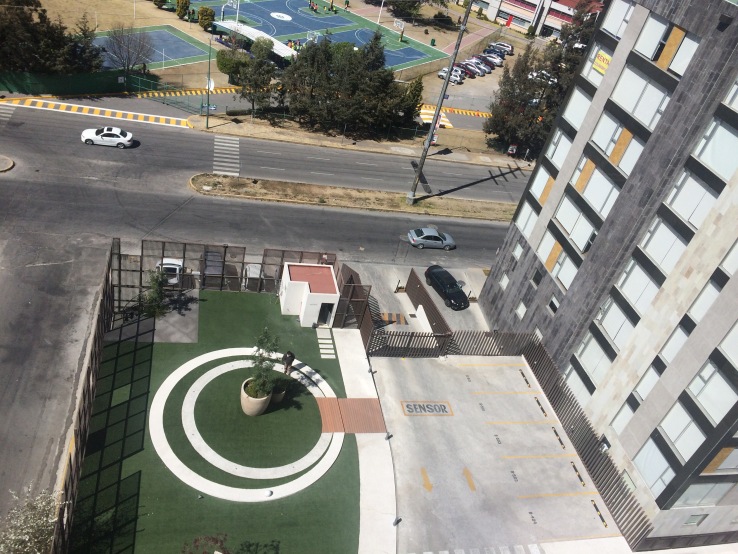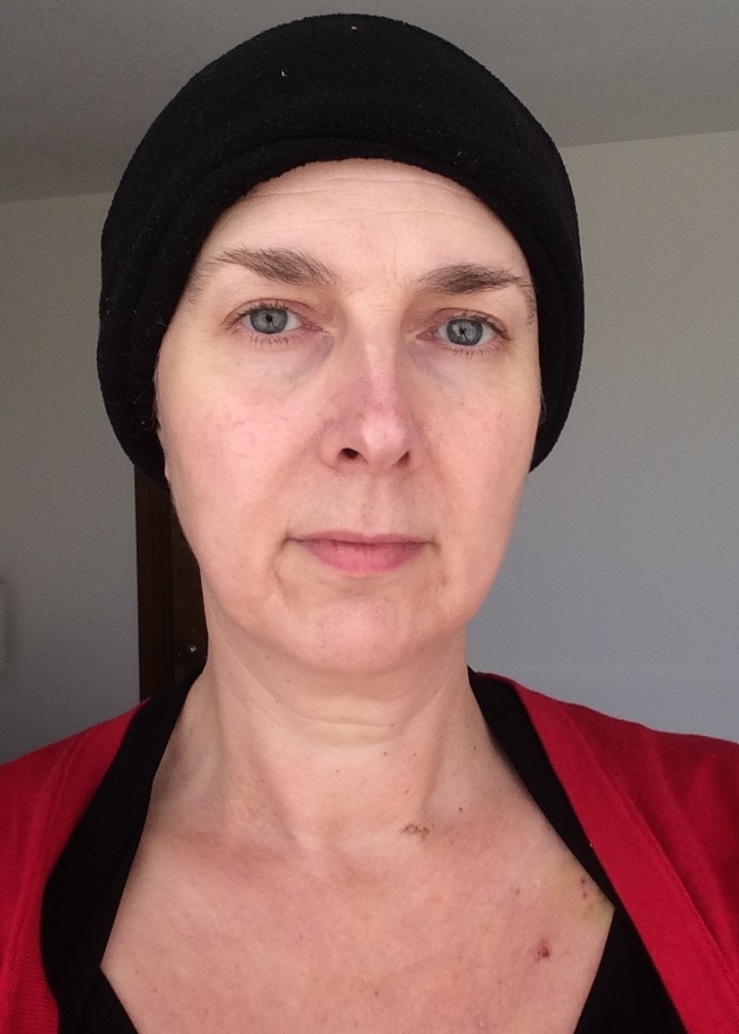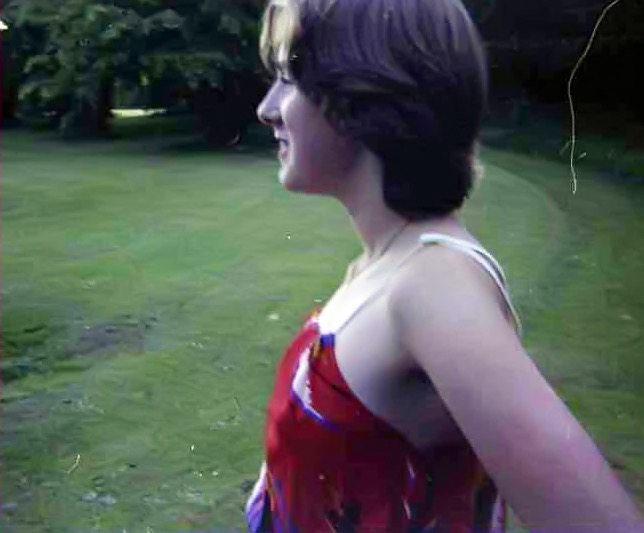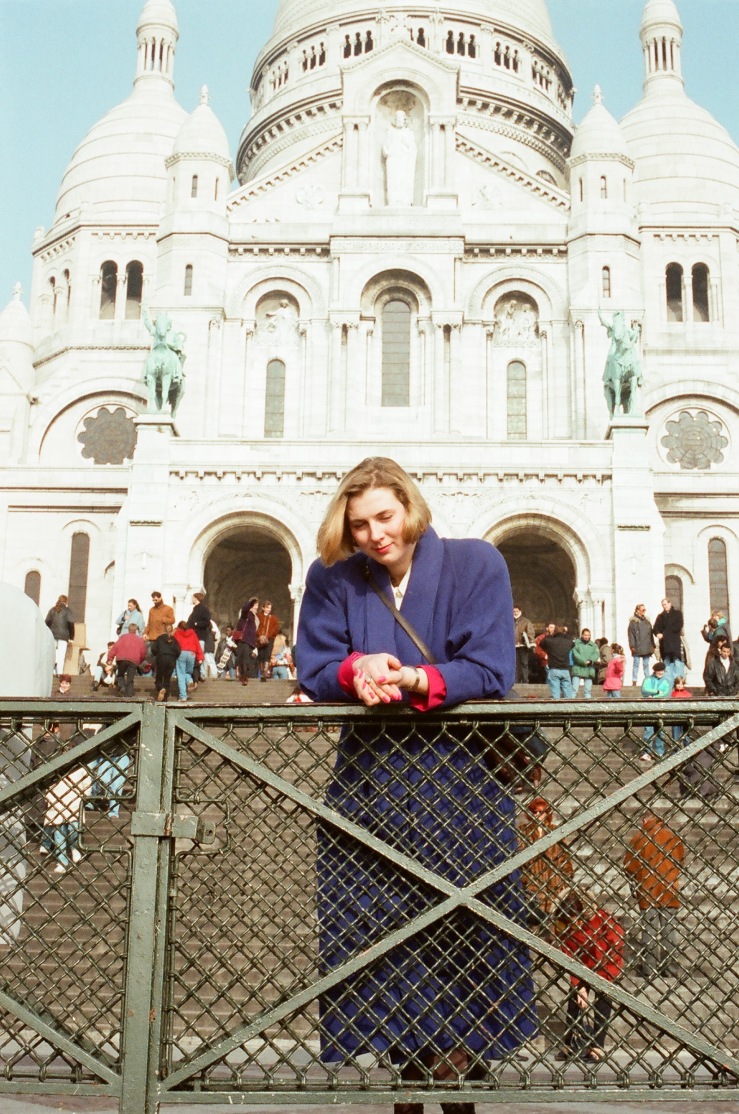
As I look out of my window this morning, after another night of broken sleep, a young man is standing in the entrance yard downstairs, peering intently at his smartphone. He bends himself into the shape of a question mark as he interrogates its tiny screen intently.
I look outside again after I have my shower and watch more hair fall – this time in handfuls – before its tries to gurgle its way down the plughole – in vain, for there is too much of it now.
The man is still there downstairs, quite oblivious to the world, or the sunshine, and even to the car trying with admirable patience not to knock him over as it reverses.
I fear for homo sapiens. Homo erectus, upright man, is already long since dead, but if our own species carries on like this, we shall definitely de-evolve. Or the robots who take over from us will decide one day that the kindest thing to do is simply to switch us off for our own sake, and replace us with something more sensible. We are so frustratingly irrational, illogical, and so much more frighteningly vulnerable than we realize.

Some days it seems a miracle that we survive at all. Humanity continues against all the odds, and completely despite itself, not forgetting the daily attacks on us by the four horsemen of the Apocalypse: pestilence, war, famine and death.
As I emerge from the shower, I wonder idly whether John Ruskin, the 19th century art critic and the foremost public intellectual of his day, might approve of me today, for it is not just the hair on my head that is falling. My locks have been entirely unlocked, and appear to be escaping from every single inch of me. I am a damsel in dis-tress.
Ruskin is believed by many to this day not to have consummated his marriage with his stunning young bride Effie Gray because (it was whispered at the time and ever since) he hadn’t realized that women had pubic hair, so accustomed was he to the smooth pulchritude of classical statuary, and recoiled from his beautiful young wife in disgust for six years until the marriage was ended.
The real story, though, may be rather different. The two married in 1848, after the then 29-year-old Ruskin – already known for his first two volumes of the influential Modern Painters – fell in love with Euphemia Gray, then aged just 19. They had first met when she was a child of 12, and he wrote the King of the Golden River for her, later wooing Effie with letter after letter proclaiming his undying passion.

But the marriage itself was miserable for both, and was finally annulled on the grounds of non-consummation, leaving Effie free to start afresh with her husband’s protégé, the painter John Everett Millais.
So what went wrong? Ruskin’s own explanation of why he didn’t fulfil his marital duties began much salacious speculation over what might have gone wrong in the marital bed. He wrote that it:
“may be thought strange that I could abstain from a woman who to most people was so attractive. But though her face was beautiful, her person was not formed to excite passion. On the contrary, there were certain circumstances in her person which completely checked it.”
Effie ignited more speculation with her words in a letter explaining that John Ruskin had finally told her his “true reason… that he had imagined women were quite different to what he saw I was, and that the reason he did not make me his Wife was because he was disgusted with my person the first evening 10th April” – their wedding night.
Robert Brownwell tells his version of the story in the book Marriage of Inconvenience, describing Ruskin as a fragile, bookish, precocious only child, and depicting Effie as a lively and flirtatious girl, and most certainly not an intellectual equal.
According to Brownwell, Ruskin’s first proposal to Effie was not accepted, and it was only when the Gray family was threatened with penury through ill-advised investments that a match with the wealthy Ruskins suddenly seemed like an excellent idea.
Brownell suggests that when Ruskin realized that his new bride did not love him in the same way, and that this was really a marriage of convenience, he was too scrupulous a man to have sex without sensing real love on Effie’s part too.
And while Effie may not have been able to consummate her marriage, she was certainly becoming the object of much admiration elsewhere.

In the end, the painter Millais provided the ideal way out. Effie was modelling for him as the soldier’s wife in his painting “The Order of Release”. My interest in her was sparked when I bought the postcard of that painting at the Tate gallery a few years ago, and wondered at the austere yet handsome woman’s face. I hadn’t realized it was Effie, the woman with the most famous pubic hair in the British Isles.
It was Ruskin himself who threw Millais and his wife together, by inviting Millais to join them on holiday to Scotland in 1853, renting a cottage and leaving his wife alone as much as possible with the man she termed the “extremely handsome” Millais.
And thus was Effie manoeuvred into starting the annulment process that would liberate both from their miserable marriage. Two doctors testified that she was still a virgin, and by the following year, the marriage was officially over.
Effie’s marriage to Millais, on the other hand, was thoroughly well-consummated, producing eight children, at which – after the last one – she suggested ‘basta’ – enough. But what a way to serve that dish of revenge. Not just cold but icy. Go, Effie, go.
Others have since suggested that Ruskin’s love of Effie when she was 12 burned rather brighter than when she was a more mature and less childish 19. And it is true that Ruskin never did marry again, although he had the consolation of the arts, becoming perhaps England’s greatest critic and social thinker of his century. So maybe he didn’t do so badly after all, though his friendship with Millais did rather suffer.
Myself, I am feeling more like Millais’s Ophelia today, drifting, drifting, drifting, down the river of Neutropenia, my hold on rational thought quite gone, my mind wandering and floating un-anchored, un-womanned as my body weakens.
I am pale and bone- and blood-less, and the bone thief has ransomed my bones for at least another two days. The bearded high priest of the blood, Dr Priesca, tells me at midday today that my neutrophils are now at just 400 or 0.4, which means I am officially almost without an immune system.

I am as vulnerable as a newborn, though rather bigger. I may cry less, but my bottles and cups still need sterilizing. And in many ways, I am just as needy, though considerably less adorable, in the same way that a newborn baby’s nappy arouses joy at his or her production, the older adult’s fuller nappy provokes disgust.
I lay awake through much of the gentle Puebla night last night, still with the window open (for what is the point in shutting it, when the bone thief has already been?) waiting until the light began to creep over the volcano that I watch from my pillow day and night.
And then, when it was almost a respectable hour, I called pathetically from my semi-slumbers to Joy at 0638 for a cup of tea, because I was too weak to get out of bed.
I am English, and find it hard to explain to Joy the way in which tea is not just tea. It is not merely a drink. And I do not drink it in the morning merely out of habit. Tea is also love. It was what my Mum (when I was a child) and sometimes my Dad and my WSM (it was the only way to rouse the sluggard teenage me) and occasionally my brothers (on especially kind days, and sometimes on holidays now), and later on my boyfriends, brought to my bedside first thing, without which the day cannot begin.
Like Molly the cat bringing in a mangled bird to lay at James and Tony’s feet in silent tribute, a cup of tea in bed is to me a sign that I am loved and wanted and treasured. On their visits to me, James and Tony both make fantastic tea, just as Joy did for me today. It is all the tribute that I shall ever need.
I have taken my tea the same way since around the age of five. Strong, but milky, and with one sugar. And I shall take my tea that way until I die, even though I did once try to skip the sugar. But the cup of tea no longer tasted like love any more, but bitter somehow, like the relationship that I knew was over when the cups of tea in the morning came grudgingly, and then not at all.
Please treat me kindly today, because if you don’t, I may just break. Or dissolve into a thousand million fragile pieces of flesh and blood. Though probably no bone.

I am, says Dr Priesca, at my nadir.
He looks me in the eye and intones solemnly: “You have no more defences”.
I wonder how he knows. I do feel rather frangible today. Perhaps even friable, as I sit in his quiet office, Joy beside me. And my mind wonders if I am perhaps through some accident of time really at an Aztec ritual at the temples at Chilula. There, the stone altars are awaiting their blood sacrifice, the drums are pounding, and the crowd fanning out beneath us, thrilling with equal horror and delight to the sound and the smell and the thought of the blood that will be spilt to seek favour with their plumed serpent god for the greater good of the tribe.
And then my fragmented brain returns, and I look more closely at Dr Priesca’s figures for my full blood count on the paper in front of him. They look spookily like my bank account a month after payday, all heading downwards precipitately towards zero.
The drums in my head stop, and the eager Aztec crowds are silenced. And it emerges when I ask the haematologist more about my nadir that it has a specific meaning in chemotherapy in reference to blood counts, particularly the white blood cell count and the platelets.
It still means a low point, but in relation to the effect of chemotherapy on normal cells that divide rapidly – such as the hair, the lining of the mouth, the intestinal tract and the blood cells.
That would explain my tender gums, my prickling scalp and my aching guts (who knew that a colon could ache? Or the roots of my teeth?) And I won’t bore you with the stranger sensations in my bottom. Suffice to say I’ve never felt anything like this level of discomfort before in that particular part of my body, although we’ve all worked for one at some stage in our lives.
Today is my very own Apocalypse Now, a film I last saw (and enjoyed hugely, if a little squirmily) in a movie theatre erected by US forces inside Saddam Hussein’s former Palace in the Green Zone in Baghdad, not long after the invasion of Iraq.
Watching it there, with proper popcorn and a can of real full-fat Coke, we emerged blinking from the fictional shootings, deaths and bombings of another era, to the real-life happening-now-in-a-whole-new-war of US military helicopters buzzing through the cloudless azure of the Iraqi skies like a plague of locusts, and the next day to filming more real violence on the streets of Iraq.
Colonel Kurtz is not a fictional figure. I am sure I met and interviewed him there in Iraq, or once sat next to him on a flight, like the US sergeant I shared a different Coke with on another dark and starry night at a secret airbase somewhere outside Baghdad as we waited for our helicopter to come in.
His opening gambit was an unusual one. “I hate them Eye-rakis. The only good Eye-raki is a dead Eye-raki.” I wondered if he had perhaps just seen the film himself, but no, he was in deadly earnest. “I’ve killed more of ‘em than you can possibly count up.”
And then he burst into tears, and told me that he’d learned that day that his wife was divorcing him and might well take their three children. He had by then done several tours of Iraq, and she said the children barely recognized him any more anyway.
I went to look for a coffee for my Sergeant Kurtz, but by the time I got back, he was no longer up for conversation. He was sitting rocking back and forth very gently next to his backpack full of heavy kit, staring at something in the distance that I couldn’t see. He didn’t look up at me at all as I set the coffee down beside him.

A few minutes later, the helicopter I’d been waiting for shuddered its magnificent steely dragonfly self gently onto the runway, and with a shout and a flashlight shone in the general direction, it was time for us to go. We were on our way to see the Brits in Basra that day, though we didn’t realize that we would be there – or almost there – for one of the oddest episodes in British military history, Operation Charge of the Knights. But that really is a story for another day.
Back to my own personal Apocalypse Now. Today, my body and I have gone through the worst of the napalm stage, and survived through most of the intervening drama, and we are now getting on towards the rather ambiguous end, when Willard finally makes it to Colonel Kurtz’s compound.
Kurtz has clearly gone insane, seeing himself as a god. And yet he still welcomes Willard’s arrival – despite knowing he has come to kill him. Kurtz – Brando – is mesmerizing and worth all the sweat, agony and the grief he caused Francis Ford Coppola on set. And as Willard drops his weapon, it’s clear he is taking on the new god-head himself, perhaps as a kind of resurrection of Kurtz. In our endings, our beginnings.
At the moment, my remaining mature blood cells are living out their end of days. My veins are choc a bloc with Colonel Kurtzes. Mad suicidal old bastards. The old white blood cells have lorded it over my veins for quite long enough, laying waste to my myelin with their napalm bombings and lack of understanding of how my body is supposed to work.
They don’t speak my body’s language, or recognize my myelin nerve sheath is me, so they must now die. And according to Dr Priesca, these blood cells do know that the end is nigh. He doesn’t add that for my blood cells today and tomorrow and maybe Sunday too, the Book of Revelation is all coming true. That may be because he is not a man given to high drama, unlike my drugged up sleepless post-chemo self, but rather a doctor given to patient, scientific explanations of the utterly fascinating and nonetheless miraculous facts about what new blood can do.
Thank God for Dr Priesca, and the gentle biochemist, and Dr Ruiz senior, and above all for my nurse Joy, who is quietly watching Mamma Mia on the TV behind me, and giggling to herself as Pierce Brosnan serenades Meryl Streep. She’s made me lunch of soup, and I try to teach her about the joy of Marmite, because it seems that the daily ritual of tea drinking has been a success. Joy now joins me regularly for a cuppa at 4pm. But it seems that Marmite is a taste too far, and I concede defeat, although Joy can now say she is ‘knackered’ with perfect ease and intonation, and most importantly of all, ‘I’m just popping to the loo’. I consider my work here to be almost done.
Back to the battle for my body and my blood. The four Horsemen of the Apocalypse or maybe Willard have come for me at last today, death and pestilence streamed gently, lovingly over the course of five hours on four separate days into my veins by the Clinica Ruiz through that suspicious serpent slithering into my chest. That tube enabled the Horsemen’s cylaphosphamide-coloured horses to trample my blood cells into their last remaining days and hours without any sign of remorse.
My old blood cells, the ones who’ve spent their lives attacking me (adios fellas! Hasta la vista, or maybe not) are today circulating in the last chance saloon, with barely time to say a fond goodbye to their loved ones, or to instruct the young stem cells on how to turn off the burglar alarm or where granny white blood cell hides her jewels (in the freezer – but why? She thinks that the rougher blood cell burglars from down the road don’t know that granny always hides her valuables in the freezer, regardless of which country or even which continent they’re on? Even the bone thief knew where to find me without any problem, and I came all the way to Mexico.)

So, my mature blood cells are in their end times. On Sunday, the high priest tells me, my new stem cells may start to work. I do hope so. And he tells me that they need take no final exam. They are born knowing their destiny, with an absolute assurance as to their job, their fate and their worth. So that settles it. My new stem cells are all boys.
But in which case – where the hell are they today? I suppose like all other young and immature medical students on a Friday night, they’re down the pub. No wonder they won’t be sober and up to any real work until Sunday at the earliest.
I enjoy the way that Dr Priesca talks about blood and what the stem cells will do. He talks about it with passion, because he loves it, and is fascinated by what the blood does, and what he can do to use our own stem cell potential to help us get better. No wonder the theologians of previous ages argued about transubstantiation for so long. The turning of the bread and wine into the body and the blood was a divine mystery, just as the stem cells that may save me for the rest of my life are too, opaque and mysterious to me in their ability to change from something unseen in the bone to a new immune system that might actually help and not hurt me. Of course, they are taking their time and dawdling a little too thoughtlessly for my liking. But then again, they are definitely boys.
Dr Priesca tells me that my blood counts will return to a reasonable level within a few days, and to more normal level within just a few weeks. And crucially, to a level high enough by the end of next week to fly home. To fly home!
But I’ve only just arrived. How can it be time to think about packing up and going home, when I’ve not seen Popocatapetl close up yet, or been able to have the full Mexican meal, or do any of the things that I really would like to have done, but the chemo and the blue mask and the lack of an immune system forbade?
Instead, I’ve spent much of the day on the corduroy sofa or in my bed, channelling Joan of Arc, albeit with rather less hair on my head than Millais paints her with in her dashing blood red skirt, and her gleaming suit of armour on top, sword laid before her, with her eyes raised in supplication to heaven, the source of the strange voices of three saints in 1425 telling her thirteen year old self to stand up to the English.

I truly hope that Michel Barnier, as he negotiates for Europe on Brexit, won’t be hearing from them any time soon. Thanks to Joan’s voices (were they saints, or were they hallucinations, brought on by adolescence and extreme stress, and her father’s attempts to marry her off?) poor young Joan was condemned by her own priests as a heretic and by the English as a witch, and burnt at the stake by the English in Rouen at the tender age of 19 in 1431, a virgin martyr.
Somewhat unforgivingly, the Cardinal of Winchester called for her to be burnt a second time, and then a third, with her cinders to be thrown into the Seine. It took a long time for Joan of Arc to be declared a saint – 1920 – just in time to become an icon and a national symbol of the cause for the French Resistance during the Second world War.
And more recently, St Joan has become an icon for the Front National in France, allied to the cause of the Le Pens. Though I must confess that when I met and sat down with Marine le Pen to interview her for the first time at her family house in St Cloud some years ago, I was unexpectedly impressed.

Here was a woman who could out-smoke me ten to one. Even her voice was gravellier than mine, and mine has always had a certain gravelitas, like the bastard child of a packet of red Marlboro mixed with a peaty Scotch whisky drunk double on the rocks late on a cold night.
Though I have given up the cigarettes now, and I think so has Marine. And I shall certainly not be running for the French presidency. Truly, the English and the French have always had a rather unsettled relationship. Did they conquer us or did we conquer them? And will our Entente Cordiale of these two old frenemies hope to survive Brexit? Stay tuned.
One last segue for today into relics. The strangest relic, and the most unholy one I ever saw, was at an exhibition in Russia in the year 2000, which included a fragment of what the organisers insisted was a fragment of Hitler’s skull.
It was a claim rejected by most experts in other nations, but we went to film it for the BBC nonetheless. There was a certain gruesome fascination in looking at that cracked sliver of pate and contemplating what Europe and the world might have looked like now had Klara and Alois not got together one dark Austrian night exactly nine months before Adolf’s birth on the 20th April 1889.
But I digress. Again. By this evening, and the delicious soup that Joy places in front of me for supper, I am rather more the Joan of Arc of Jean Seberg, or even (though not facially – I just mean the final hairdo) Milla Jojovich in the 1999 film, notable mainly for her luminous performance.
Though no critic ever slammed that film quite so pithily as the NYT film critic on the 2015 release of a film about Effie Gray and her disastrous marriage to Ruskin.
“The cinematic equivalent of a Brazilian wax”.
That was it for me. I read the review and never did go to see the film, which (after my inadvertent Mexican chemo wax) I now rather regret.
Luckily, nobody is planning to burn me at the stake today, nor divorce me over my hair. But as liberals across the world over tear out their hair strand by strand with indignation on the day of the Inauguration of President Donald J Trump, my over-achieving self has inadvertently (and without thinking too long or too hard about it) trumped them all.
I have all had the remaining hair on my head shaved off in one go, in the full knowledge that most of the dawdling follicles were secretly planning a later escape.

So I am now rocking the imprisoned Polish peasant look (that’s not a racial slur – my grandparents were imprisoned Poles from the working classes, so there is a family history there). You could also term it the early Victorian workhouse aesthetic, or the chic Parisienne collaborateuse after the war look. It was done quickly, thanks to Anne and Phil’s borrowed clippers and some surprisingly gentle shearing by Joy.
So effective and quick was it that by the time I sat in Clinica Ruiz watching a man with longer and stranger (and certainly more orange) hair than mine take charge at the White House on Fox News, I had not a single tress left on my head that was longer than 19mm, or 1.9cm. That’s three quarters of an inch to you, Dad and WSM.

I heard the pundits discuss the meaning of Trump’s line “we are transferring power from Washington, DC, and giving it back to you, the people,” which some of those less enamoured with his rise to power took to mean that he was channeling Bane, the villain in the Batman film The Dark Knight Also Rises.
But enough of that. The night is rising here, and it’s dark outside. Popacatapetl sleeps and grunts occasionally to his sleeping wife beside him, breathing out small tendrils of white smoke as he snores. She made him give up the cigarettes years ago, because of his explosive cough, so he took up the cigars instead (only the best Cuban ones, mind) so that once a year, around Christmas, he can still truly set the sparks flying as he lights up with relief, and breathes out a proper skyful of clouds.
And from here beneath the volcano, this damsel-without-tress is off to sleep.



I just love the way you weave stories round and round but your own narrative keeps it all together, that’s so clever and really keeps the interest going. And the “damsel in dis-tress” line ….. Boom Boom. I can’t quote Millais but to quote that great 20th Century philosopher Yazz, “the only way is UP”.
LikeLike
Beautiful writing Caroline. I’m almost there with you. You guardian Angel is always with you remember. Onwards and upwards! xxx
LikeLike
Hi Caroline, really enjoyed reading your day 6 – having only really scanned the previous blogs in passing mostly because the treatment you are undergoing freaked me at first but this morning’s read was fascinating – no it was actually mind blowing and the beautifully written prose was addictive. I kept wondering/worrying are all the bad white corpuscles gone ? – are they hiding somewhere to come back – then if they have all gone, what will defend you, who teaches the new stem cells, how long will it take – but then I read that you are expected to have recovered your immunity soon enough to go home next week – amazing. After so many years visiting battlefields for the BBC your body is now the battlefield – the story is you – for once our correspondent is on the spot!
I read this while having a Saturday morning lie-in -it’s freezing in W10 – I had forgot to put on the central heating – Yo was up bustling around getting ready to join the London march against President Dumph – I’m sure her comments will follow – will say a prayer and light a candle – Jim
LikeLike
Indomitable! magnificent! brilliant and the prospect of going home in sight. ENHORABUENA !! sending healing strength giving vibes from the beautiful Colchage Valley in Chile. A bottle of amazing Carmenere going in my case to be shared on the terrace at Arlie to toast the renewed you. Abrazos xx
LikeLike